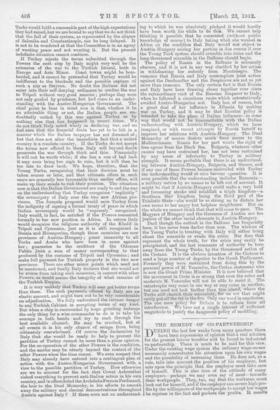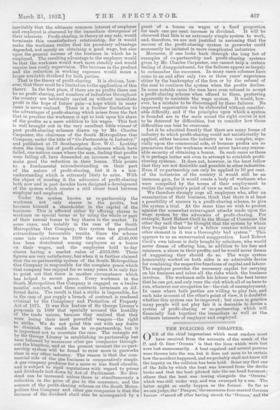THE REMEDY OF CO-PARTNERSHIP. D URING the last few weeks from
many quarters there have been expressions of opinion that a real solution for the present labour troubles will be found in industrial co-partnership. There is much to be said for this view. Under the existing wage system the ordinary wage-earner necessarily concentrates his attention upon his own wages and the possibility of increasing them. He does not, as a rule, take into account the position of his employer, but acts upon the principle that the employer must take care of himself. This is also true of the attitude of many employers—perhaps we may even say of most—towards their workpeople. They, too, say that the workman must look out for himself, and if the employer can secure high pro- fits by the willingness of the workpeople to accept low wages he rejoices in the fact and pockets the profits. It results inevitably that the ultimate common interest of employer and employed is obscured by the immediate divergence of their interests. Profit-sharing, in theory at any rate, would terminate this unsatisfactory relationship, for it would make the workman realize that his pecuniary advantage depended, not merely on obtaining a good wage, but also upon the general success of the business in which he is employed. The resulting advantage to the employer would be that the workman would work more steadily and would require less costly supervision. The increase in the product and the reduction in working expenses would mean a larger available dividend for both parties. That is the theory of profit-sharing. It is obvious, how- ever, that there must be a limitation to the application of this theory. In the first place, if there are no profits there can be no profit-sharing, and numbers of industries throughout the country are habitually carried on without immediate profit in the hope of future gain—a hope which in many cases is never realized. There is a further limitation to the advantages of profit-sharing which arises from the fact that in practice the workman is apt to look upon his share of the profits as a mere addition to his wages. This fact is well brought out in the very excellent little resume of past profit-sharing schemes drawn up by Mr. Charles Carpenter, the chairman of the South Metropolitan Gas Company, under the title of " Co-Partnership in Industry," and published at 73 Southampton Row, W.C. Looking down the long list of profit-sharing schemes which have failed, one notices cases where the men, finding that profits were falling off, have demanded an increase of wages to make good the reduction in their bonus. This points to a fundamental misunderstanding on their part of the nature of profit-sharing, but it is a mis- understanding which is extremely likely to arise. With the object of meeting it the advocates of profit-sharing both now and in past decades have designed a development of the system which creates a still closer bond between employer and employed.
Under the system known as co-partnership the workman not only shares in the profits, but becomes himself a shareholder in the capital of the business. This is effected either by offering shares to workmen on special terms or by using the whole or part of their annual bonus to buy shares in the market. In some cases, and notably in the case of the South Metropolitan Gas Company, this system has produced extraordinarily favourable results. Since the scheme came into existence in 1899 the sum of £549,000 has been distributed among employees as a bonus on their wages, and the employees hold to-day shares having a market value of £353,000. These figures are very satisfactory, but when it is further claimed that the co-partnership system of the South Metropolitan Gas Company is responsible for the complete peace which that company has enjoyed for so many years it is only fair to point out that there is another circumstance which has helped to secure peace. Every workman in the South Metropolitan Gas Company is engaged on a twelve months' contract, and these contracts terminate on dif- ferent dates. The result is that a strike is impossible, for in the case of gas supply a breach of contract is rendered criminal by the Conspiracy and Protection of Property Act of 1875. It was this feature of Sir George Livesey's proposals in 1889 that specially aroused the hostility of the trade unions, because they realized that they were losing their most powerful weapon—the right to strike. We do not point this out with any desire to diminish the credit due to co-partnership, but it is important not to overstate the case. The example set by Sir George Livesey in establishing co-partnership has been followed by numerous other gas companies through- out the kingdom, and at the present moment the co-part- nership !system will be found to exist more in gasworks than in any other industry. The reason is that the com- mercial side of the gas business is comparatively simple. A gas company produces for a more or less fixed clienale, and is subject to rigid regulations with regard to prices and dividends laid down by Act of Parliament. No divi- dend can be increased unless there is simultaneously a reduction in the price of gas to the consumer, and the essence of the profit-sharing scheme on the South Metro- politan Gas Company and other gas companies is that the increase of the dividend shall also be accompanied by a grant of a bonus on wages at a fixed proportion for each one per cent. increase in dividend. It will be observed that this is an extremely simple system to work, and, therefore, we are not justified in assuming that the success of the profit-sharing system in gasworks could i necessarily be imitated in more complicated industries. Moreover, if one looks back through the long list of examples of co-partnership and profit-sharing systems given by Mr. Charles Carpenter, one cannot help a certain feeling of disappointment, for the failures appear so largely to outnumber the successes. In many cases schemes have come to an end after only two or three years experience either by the bankruptcy of the firm or by the refusal of the men to continue the system when the profits decline. In some notable cases the men have even refused to accept a profit-sharing scheme when offered to them, preferring apparently to maintain the wage system. It would; how- ever, be a mistake to be discouraged by these failures. No improved organization can be elaborated without consider- able difficulty, and if the principles upon which a system is founded are in the main sound the right course is not to be deterred by difficulties, but to consider how those difficulties can best be overcome.
Lot it be admitted frankly that there are many forms of industry to which profit-sharing could not satisfactorily be applied, either because the industry is too complex, espe- cially upon the commercial side, or because profits are so precarious that the workman would never have any reason- able security of obtaining a bonus. In such cases as these it is perhaps better not even to attempt to establish profit- sharing systems. It does not, however, in the least follow that they are not desirable and possible in other industries. Even if co-partnership can only be applied to 10 per cent. of the industries of the country it would still be an immense gain, for it would create a body of workmen who were compelled by the terms of their employment to realize the employer's point of view as well as their own. We therefore strongly urge all employers who, after an examination of their business, think that there is at least a possibility of success in a profit-sharing scheme, to give the system a trial. At the same time we wish to protest against the somewhat extravagant attacks made upon the wage system by the advocates of profit-sharing. For example, Lord Robert Cecil in the House of Commons the other day said that " he thought that the system by which they bought the labour of a fellow creature without any other element in it was a thoroughly bad system." This appears to us an unwarranted exaggeration. Lord Robert Cecil's own labour is daily bought by solicitors, who would never dream of offering him, in addition to his fees and retainers, a share in their profits, and he would never dream of suggesting they should do so. The wage system honourably worked on both sides is an admirable device for combining the respective functions of capital and labour. The employer provides the necessary capital for carrying on his business and takes all the risks which the business involves. The workman sells his labour on the best terms that he can get, and only runs the risk which all of us have to run, whatever our occupation be—the risk of unemployment. In cases where both parties are willing to play fair, and each take account of the other's point of view, it is doubtful whether this system can be improved ; but since in practice many people will not play fair it is desirable toievisea system of profit-sharing or co-partnership which will financially link together the immediate as well as the ultimate interests of employer and employed.







































 Previous page
Previous page